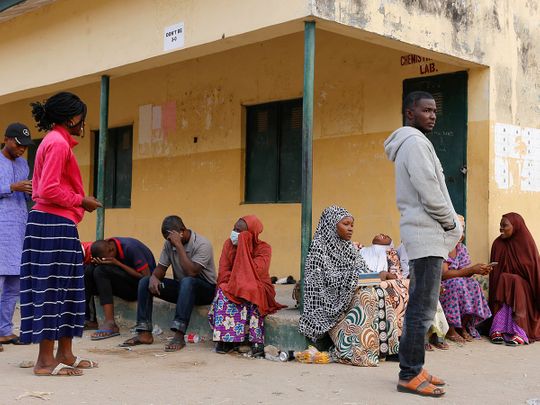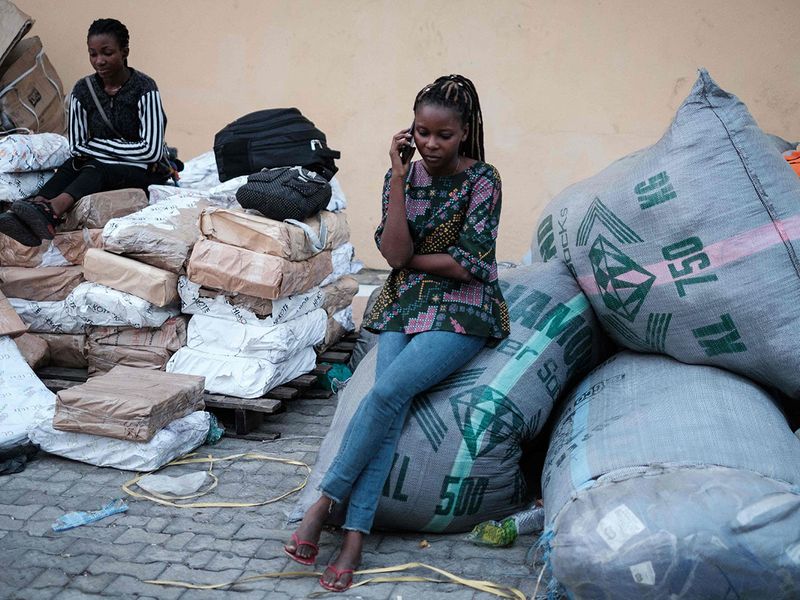
Abuja: Nigeria's president says he is "deeply disappointed" by the last-minute delay of Saturday's election until February 23 and says he is going back to the capital to hear the electoral commission's explanation.
President Muhammadu Buhari's statement says the commission had "given assurances, day after day and almost hour after hour that they are in complete readiness for the elections. We and all our citizens believed them".
His statement also appeals to Nigerians for calm, urges the commission to protect already distributed voting materials and stresses that his administration does not interfere in the commission's work.
He calls this a "trying moment in our democratic journey."
Earlier, Nigerians hoping to cast their ballots in presidential and parliamentary elections were turned away from polling stations on Saturday after the electoral watchdog's snap decision to delay the vote by a week.
Many voters were caught unawares by the early morning announcement and arrived at polling places to find the doors barred and the staff absent.
"Why didn't they announce the delay earlier? Why make the announcement in the middle of the night?" asked Chidi Nwakuna, a businessman who'd shown up early to vote in the southern city of Port Harcourt.
Polling had been due to start at nearly 120,000 polling stations in Africa's most populous nation at 0700 GMT, with a record 73 candidates on the ballot.
President Muhammadu Buhari, 76, was set to seek a second term of office against a stiff challenge from the main opposition candidate, former vice president Atiku Abubakar, 72.
But rumours began circulating late on Friday about a possible postponement after widespread reports of problems with the delivery of election materials, including ballot papers.
Members of the Independent National Electoral Commission (INEC) met in emergency session in Abuja and after examining the logistics plans concluded the timetable was "no longer feasible", commission chairman Mahmood Yakubu said.
I see this postponement of the election as a... ploy to rig
Parliamentary elections for 360 seats in the lower House of Representatives and 109 seats in the Senate will be held on the same day.
Governorship and state assembly elections will be pushed back to March 9, Yakubu said.
"This was a difficult decision for the commission to take but necessary for the successful delivery of elections and the consolidation of our democracy," he added.
The two main political parties swiftly condemned the move and accused each other of orchestrating the delay as a way of manipulating the vote, sentiments echoed by voters.
"I see this postponement of the election as a... ploy to rig," said Oyi Adamezie, a voter in the city of Warri.
Disappointment
Buhari's campaign spokesman Festus Keyamo, for the ruling All Progressives Congress (APC), said the news was a "huge disappointment" and hit out at INEC for being unprepared.
For his part, Abubakar of the main opposition Peoples Democratic Party (PDP) blamed the Buhari government for "instigating the postponement" but called on his supporters to remain calm.
"We will overcome this. You can postpone an election but you cannot postpone destiny," he added in a statement.
Nigeria has postponed voting before: in 2015, INEC announced a six-week delay just one week before the election, citing security concerns linked to the Boko Haram insurgency.
The six-week delay was seen as a way for then president Goodluck Jonathan to claw back votes after a strong challenge from Buhari, then an opposition candidate.
The same argument may be made again, with little to separate Buhari and Abubakar.

Both candidates had already arrived in their home states to vote, with Buhari in Katsina in the northwest and Abubakar in Adamawa in the northeast.
But even before the delay's announcement, challenges were apparent in the vote's organisation.
In many areas suffering intermittent electricity supply and poor road infrastructure, thousands of INEC agents had been working into the night to deliver election materials.
On Saturday the roads in the largest city Lagos were uncharacteristically empty, as INEC staff expressed dismay at the postponement.
"They had much time to prepare," said Austin Onwusoanya, a civil servant who was to manage a polling unit in the Ikoyi neighbourhood. "There are other things going on."
Campaign trail
Saturday's last-gasp postponement comes after an election campaign in which Buhari had sought to portray himself as a continuity candidate.
He came to power in 2015 on a promise to defeat Boko Haram Islamists, tackle rampant corruption and improve the country's oil-dependent economy.
But the jihadists still mount attacks and there is widening insecurity elsewhere, while slow growth as the economy limps back from recession has hit Buhari's stock.
So, too, has the perception he has only targeted political opponents as part of his high-profile anti-corruption campaign, while he has also been accused of authoritarianism.
Buhari's purported shortcomings have been a feature of Abubakar's campaign, who has billed himself as a modern, energetic and pro-business leader.
The language of the campaign has reminded voters of the president's former life as an army general who headed a military government in the 1980s.
Abubakar's past has also featured prominently, as the ruling party resurrected controversies from his time as vice president and alleged links to corruption.
The election - the sixth in the 20 years since civilian rule was restored - is likely to be one of the last times men of Buhari and Abubakar's generation will feature so prominently.
They have been fixtures on Nigeria's turbulent political scene for decades and are the oldest on the ballot.
Just over half of the 84 million registered voters are aged 18-35, prompting calls for more representative candidates unburdened by involvement in Nigeria's traumatic past.












